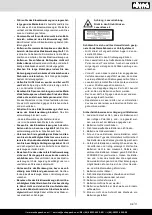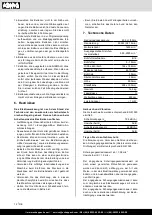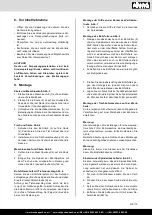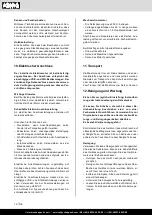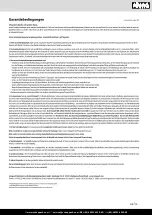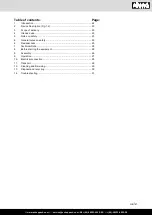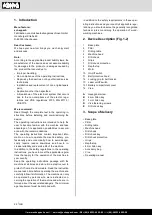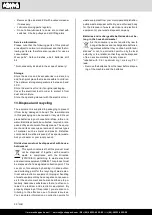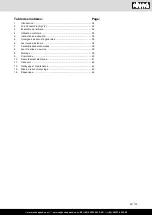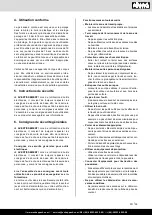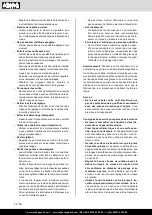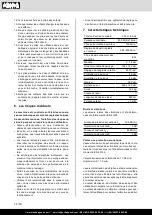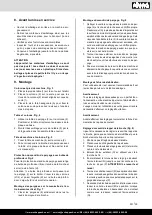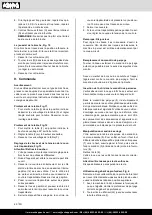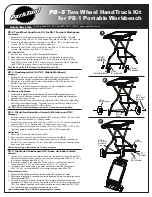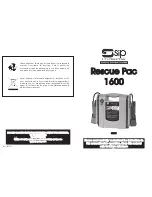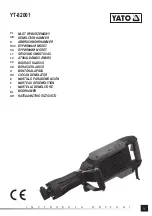
www.scheppach.com /
+(49)-08223-4002-99 /
+(49)-08223-4002-58
GB | 25
About disposal facilities you can inform by your
municipal or city government.
7. Do not allow batteries to heat up!
8. Do not weld or solder directly on batteries!
9. Do not dismantle batteries!
10. Do not allow batteries to deform!
11.
Do not throw batteries into fire!
12. Keep batteries out of the reach of children.
13. Do not allow children to replace batteries without
supervision!
14.
Do not keep batteries near fire, ovens or other
sources of heat. Do not use batteries in direct
sunlight or store them in vehicles in hot weather.
15. Keep unused batteries in the original packaging
and keep them away from metal objects. Do not
mix unpacked batteries or toss them together!
This can lead to a short-circuit of the battery and
thus damage, burns or even the risk of fire.
16. Remove batteries from the equipment when it will
not be used for an extended period of time, unless
it is for emergencies!
17. NEVER handle batteries that have leaked without
appropriate protection. If the leaked fluid comes
into contact with your skin, the skin in this area
should be rinsed off under running water imme
-
diately. Always prevent the fluid from coming into
contact with the eyes and mouth. In the event of
contact, please seek immediate medical atten-
tion.
18. Clean the battery contacts and corresponding
contacts in the device prior to inserting the bat-
teries:
6. Residual risks
The machine has been built according to the
state of the art and the recognised technical
safety requirements. However, individual residu-
al risks can arise during operation.
• Health hazard due to electrical power, with the use
of improper electrical connection cables.
• Furthermore, despite all precautions having been
met, some non-obvious residual risks may still re-
main.
• Residual risks can be minimised if the „safety in-
structions“ and the „Proper use“ are observed
along with the whole of the operating instructions.
•
Do not load the machine unnecessarily: excessive
pressure when drilling will quickly damage the drill-
ing bit, which results in reduced output of the ma-
chine in the processing and in drilling precision.
• When cutting plastic material, please always use
clamps: the parts which should be cut must always
be fixed between the clamps.
• Avoid accidental starting of the machine: the op-
erating button may not be pressed when inserting
the plug in an outlet.
•
Store unused power tools in a safe place. The
storage place should be dry and lockable.
This
prevents the power tool from being damaged as
a result of being stored or operated by inexperi
-
enced people.
•
Never leave the tool before it has come to a
complete standstill.
Afterrunning bits can cause
injury.
•
Do not use the power tool with a damaged ca-
ble. Do not touch the damaged cable and pull
the mains plug if the cable is damaged while
working.
Damaged cables increase the risk of
electric shock.
Attention: Laser radiation
Do not stare into the beam
Class 2 laser
Protect yourself and you environment from ac-
cidents using suitable precautionary measures!
• Do not look directly into the laser beam with un-
protected eyes.
• Never look into the path of the beam.
•
Never point the laser beam towards reflecting sur
-
faces and persons or animals. Even a laser beam
with a low output can cause damage to the eyes.
•
Caution - methods other than those specified here
can result in dangerous radiation exposure.
•
Never open the laser module. Unexpected expo
-
sure to the beam can occur.
•
If the mitre saw is not used for an extended period
of time, the batteries should be removed.
•
The laser may not be replaced with a different type
of laser.
• Repairs of the laser may only be carried out by the
laser manufacturer or an authorised representa-
tive.
Safety instructions for handling batteries
1. Always make sure that the batteries are inserted
with the correct polarity (+ and –), as indicated on
the battery.
2. Do not short-circuit batteries.
3. Do not charge non-rechargeable batteries.
4. Do not overcharge batteries!
5.
Do not mix old and new batteries or batteries of
different types or manufacturers! Replace an en
-
tire set of batteries at the same time.
6. Immediately remove used batteries from the de-
vice and dispose of them properly! Do not dispose
batteries with household waste. Defective or used
batteries must be recycled according to Directive
2006/66 / EC. Give back batteries and / or the
device has been offered to the collective facilities.

